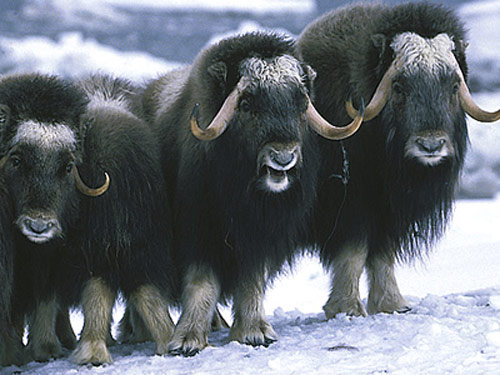(单词翻译:单击)
听力文本
This is Scientific American — 60-Second Science. I'm Steve Mirsky.
Got a minute?
"So I just don't approach, at least initially, a group of musk oxen."
Joel Berger, with the Wildlife Conservation Society and Colorado State University.
"What I do is to take into account other factors that might reflect their responses. And so what I need to know is something about the group size, whether or not males are in the group. I need to know something about snow depth, about snow penetration or how hard the snow is. And then I'll approach and try to understand whether they stay, whether they flee, whether they charge."
Oh, one more important point. When Berger approaches the musk oxen, on Russia's Wrangel Island north of the Arctic Circle, he's dressed up like a polar bear.
"I know the media has a good time when we dress up as animal models. Of course they do. But remember, two Nobel laureates, Conrad Lorentz and Niko Tinbergen, led the way for getting inside the minds of animals...and they've done this through innovative models."
Polar bears prefer seals for their meals. But the loss of sea ice is forcing them onto the land to hunt for prey that's usually not on their menu. The idea here is to gauge the response of musk oxen to this formerly rare threat.

"It's really tough to get inside the mind of a musk ox and especially to understand from mere anecdotes how they may respond in this emerging dynamic."
Berger works with Russian researchers on their side of the Bering Strait and with Americans in Alaska.
"We're currently in the process of evaluating more than 100 simulated interactions, some that include our three years of work in Alaska, as well as over on the Russian side...the last time I did something like this was about 15 years ago, to understand how moose and other species would respond to the new threat of wolves in and around the Yellowstone system."
Back then, Berger and his wife would get into a moose outfit to be able to get close to the ungulates. I wrote about that effort in 1997. You can find it by googling my name and Joel Berger—a man who's work really suits him. (That joke was unbearable.)
Thanks for listening Scientific American — 60-Second Science Science. I'm Steve Mirsky.
参考译文
这里是科学美国人——60秒科学。我是史蒂夫·米尔斯基。
有一分钟时间吗?
“我不会靠近,至少不会从一开始就靠近一群麝牛。”
乔尔·博格在野生动物保护协会和科罗拉多州立大学工作。
“我采取的方法是,把其他可能影响它们反应的因素都考虑进去。我需要知道麝牛群的规模,这群麝牛里是否有雄性麝牛。我还要了解积雪的深度、渗透性及硬度。之后我才会逐渐靠近它们,试图去了解它们是会留在原地,会逃走,还是会发动攻击。”
还有一个重点。博格在位于北极圈以北的俄罗斯弗兰格尔岛靠近麝牛时,他会打扮得像一只北极熊。
“我知道媒体看到我们打扮成动物的样子会很高兴。他们当然会高兴。不过要记住,引领我们去了解动物思想的是两位诺贝尔奖获得者——康拉德·洛伦兹和尼古拉斯·廷伯根,他们采用的就是创新模式。”
北极熊最爱吃海豹。但是海冰的减少迫使它们去陆地上捕食本不在它们捕食范围内的猎物。博格的目的是评估麝牛面对这种罕见威胁时的反应。
“了解麝牛的想法真的非常难,只凭轶事来了解他们会如何应对这种新出现的变化更难。”
博格同俄罗斯研究人员在白令海峡划分的俄罗斯境内一起工作,同美国研究人员在阿拉斯加工作。
“目前我们正在对100余个模拟交互作用进行评估,这其中包括阿拉斯加方面三年的工作成果,以及俄罗斯方面的成果,我上次做这种工作是在15年前,当时我研究的是驼鹿和其他物种如何应对黄石公园内部和周边狼群的威胁。”
那时,博格和他的妻子会穿上驼鹿装,以接近这一有蹄类哺乳动物。1997年时我曾写过有关那次研究的文章。听众可以用谷歌搜索我和博格的名字找到这篇文章,博格的工作真的很适合他。(这个玩笑很无聊)
谢谢大家收听科学美国人——60秒科学。我是史蒂夫·米尔斯基。
译文为可可英语翻译,未经授权请勿转载!
重点讲解
重点讲解:
1. take into account 考虑到;把…计算在内;
例句:He will take into account my request.
他会考虑我的要求。
2. dress up 装扮;打扮;
例句:He often dresses up as a superman.
他经常把自己装扮成超人。
3. hunt for (人)打猎,猎杀;(动物)猎食;
例句:Davy liked to hunt for bears best of all.
大卫最喜欢猎熊了。
4. repond to 应对;作出回应;作出反应;
例句:A child's age affects the child how repond to the diaster.
孩子的年龄也会影响他们对灾难的反应。


